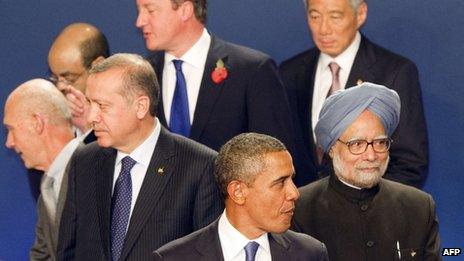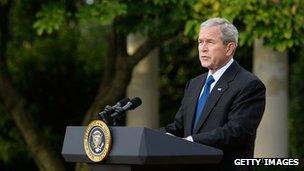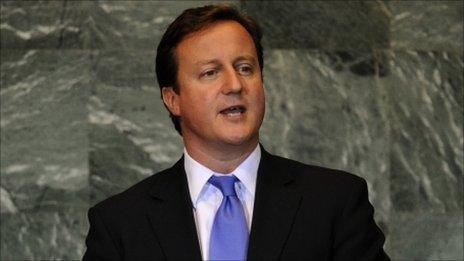Has Obama changed America's standing in the world?
- Published
- comments

At the G20 America is perhaps inevitably on the sidelines, external. Exhorting. Not laying down the law. But some worry that has become almost doctrine.
President Obama's actions abroad can exacerbate existing worries about its role in the world.
America may seem too young a country to be suffering from a mid-life crisis. But people who grew up in a nation that never doubted its power, wealth and vigour are suffering status anxiety.
Are they no longer the best? Doomed to decline?
From those fears flow more questions. Have they been too arrogant? Are they no longer feared? Is being loved more important ?
President Obama inherited this; he didn't invent it.
Changing America's image
Inside the White House a rather grim-looking President Obama strides past me, muttering distracted greetings as he leaves the Situation Room, external.
Not far behind is Ben Rhodes, his speech writer, external and senior foreign adviser. He tells me that President Obama has improved America's image in the world.
"He has always rejected the notion that there is some sort of choice between realism and idealism in foreign policy. His view is fundamentally that America acts in our interests - our security interest, our economic interest - but because of the nature of the country we are, that is always undergirded by a sense of idealism and values.
"Because we believe the success of human rights around the world leads to more stable situations and more reliable partners. When the United States is building international and collective action in terms of common challenges, that meets our idealism about global action.
"But it is also in our interests because it fosters burden-sharing, reduces costs and creates great legitimacy for what we are doing."
He says when President Obama came into office he was determined to change America's image in the eyes of the world.
"The two wars had over-militarised our foreign policy. We had very large military footprints overseas.
"But we had a reduction in America's standing in the world in part because of the war in Iraq, and so it was harder to get agreement on key issues. So we really came into office thinking about how we could change the face of American foreign policy."
A jokey intimacy
But critics say President Obama hasn't worked hard enough at the personal dimension of diplomacy; that he just doesn't have any friends among foreign leaders.
It is something the White House agonises about.
They blame it on the domestic economic crisis, which has put paid to the leisurely week-long foreign trips that allowed former Presidents Bush and Clinton to schmooze their way to a jokey intimacy with fellow presidents and prime ministers.
Elliot Abrams, who was an assistant secretary of state, external and then on the national security team in Republican White House administrations, says he has seen first-hand how that can pay off, but President Obama tried to rely on his dazzle.
"The effort to use American soft power resolved itself pretty quickly into an effort to use Barack Obama. The soft power was 'me'. 'Here I am, I am something new.' That didn't do it. It didn't change the way people reacted to the United States.
"He damaged early on the relationship with Britain. No particularly close relationship with France. Or Germany. Or Mexico. The re-set with Russia has not paid off. Not a lot has been achieved."
But this is nuts and bolts. The more serious claim is that from hesitating over the Arab Spring to a planned speedy withdrawal from Afghanistan; from re-setting relations with Russia to seceding to Europe the most prominent role in Libya, President Obama has presided over a decline in America's role.
Still a majority shareholder in World Inc but not the all-powerful CEO.
In the unguarded phrase of an anonymous White House insider, a policy of leading from behind. Mr Abrams says it is damaging.
"I think that the president's view is not that America should be the great leader of the free world, the traditional American view.
"I think he comes from a different perspective where the United States is on the wrong side on many historical examples, siding with many bad regimes and the restraint of American power is more his line.
"He seems to be more interested in constraining the ability of the United States to have its way than helping the US have its way."
Light to the world
President Obama infuriates those who believe in American exceptionalism.
He once said: "I believe in American exceptionalism just as I suspect that the Brits believe in British exceptionalism and the Greeks believe in Greek exceptionalism."
That is what offends: the notion that America is just another great power and like all great powers will decline one day.
Many here in the US believe America is exceptional because, for them, it has a one-off, unique, almost pre-ordained destiny in the world - to do good.
Mr Rhodes says the president does, too. He is just more subtle about it. He is not the president of decline.

Some commentators say America's image was in decline before President Obama took office
"It is actually the opposite," Mr Rhodes says. "If you look at the period of time when America had challenges, it was actually under the previous administration. That is when we saw the diminution of American standing in the world.
"That is when you saw the emergence of other nations like China as key powers in the world; that is when you saw other countries seeking to align themselves against American interests.
"We think we have reversed those trends and are rebuilding America's standing and leadership. As for American exceptionalism, the entire Obama campaign in 2008 was about American exceptionalism: that in no other country would it be possible for a candidate like Barack Obama to be elected.
"That message of American exceptionalism is fundamental to who he is. Exceptionalism is about who we are as a country, that we can evolve over time, address our own imperfections - whether slavery or civil rights - and in our own effort to make a more perfect union set an example that is a light to the entire world."
Foreign relations won't play a huge part in the next year's election debates and dialogues, although most Americans are pleased the troops are coming home.
But how the president sees America and what he thinks about the challenges to its supremacy is the backdrop to everything else.
This is the third in a series for the Today programme, external.
You can hear yesterday's report by clicking here, external.
On Sunday I will look at what might happen on Tuesday 6 November next year, from the key state of North Carolina, for the News at Ten and there will be a posting here too.
- Published3 November 2011
- Published26 September 2011

- Published22 September 2011
